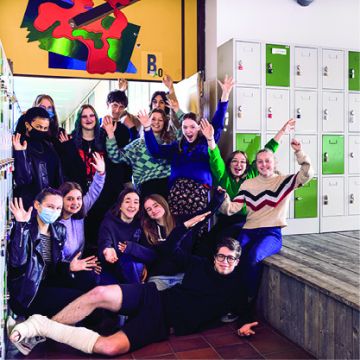Unia filed a record number of discrimination cases in 2021
The number of complaints recorded in 2021 sadly surpassed the 10,000 mark. Unia, as a result, filed 2,379 individual cases of discrimination, hate speech or acts of hate - a record number. "Behind these cases, there are, above all, 2,379 people who have felt discriminated against and for whom Unia is rolling up its sleeves to find appropriate resolutions", explained Patrick Charlier, Director of Unia, at the publication of the institution's annual report.
Unia's annual report is availible in French, Dutch and German.
The COVID-19 pandemic has, of course, had an impact on these figures, accounting for 320 complaints. The COVID Safe Ticket and the vaccination campaign led to discrimination in access to basic rights, including health care and personal assistance. Unia has identified these in several publications and has provided frameworks to better ensure that these rights are respected across various sectors in times of crisis.
Up 23.5% compared to the average of the last five years, access to goods and services (housing, health care, shops, etc.) was the area for which Unia was most often called upon in 2021, with a total of 698 cases filed. This was closely followed by discrimination in the labour market, with 603 cases filed, but all sectors of society were affected. Unia gave a comprehensive overview of discrimination in Belgium in its report.
Access to housing: discrimination persists
Housing cases represented 45.8% of the cases filed in goods and services. They have been steadily increasing since 2016. The risk of discrimination is exacerbated by the lack of affordable housing, particularly quality housing adapted to personal and family situations.
The main discriminating criterion, in almost 41% of the cases, is the state of wealth: some landlords refuse on principle to accept prospective tenants with incomes such as unemployment, integration benefits or other social assistance, which is illegal. Some landlords refuse, on principle, applicants with incomes such as unemployment benefits, social integration benefits or other welfare benefits. This too is illegal. An assessment of individual situations is a must. Unia has also been called upon to deal with discrimination in housing on the basis of 'racial' criteria (30.5% of cases) and disability (10.5%).
Prospective tenants don’t always realise that they have been discriminated against by a landlord. "There's an urgent need to better identify the reality of discrimination in the private rental market. Unia is pleased to have been able to collaborate with Belgium's regions to develop situational tests and examine the regulations that will govern them," underlined Patrick Charlier.
Unia also collaborated and offered its support to cities and municipalities, by giving training to housing actors, participating in working groups and developing tools to raise awareness.
More than a third of cases are resolved out-of-court
Unia resolved 2,584 individual cases in 2021. Half of these were deemed to be based on anti-discrimination legislation.
Unia put forward 186 opinions and recommendations to help victims defend themselves against discrimination.
A large proportion of the cases are dealt with through mediation: "Unia has been able to reach out-of-court settlements for 515 victims", notes Patrick Charlier. "We were able to have the discrimination recognised and stopped; obtain compensation for the victim if provided for in law; and avoid any future discrimination by putting in place structural measures. Only 2% of cases in 2021 had to be prosecuted (with or without Unia being a party to the case)", he concluded.
Unia always favours mediation, but the fact that a case can go to court is a powerful incentive for parties to find an out-of-court resolution.
Comparable articles
Unia takes a stand for getting along together, even in times of corona crisis
The corona crisis that is gripping our country has fuelled mutual distrust among citizens. “We notice that there is a strong tendency to look for culprits or scapegoats”, says Els Keytsman, director of Unia. “This is a trend that we must counteract. Nobody benefits from it. We would do much better to support the countless forms of solidarity created by the pandemic. The corona crisis is certainly not over yet. We have to learn to live with this virus without destroying the solidarity in our society.”
Unia is here for you - coronavirus or not
Pandemic or not, we are here to combat discrimination. Unia is here to listen and to help. Subject, of course, to the appropriate precautions. How does this affect you?
Number of reports of discrimination rises by over 13%
In 2019, Unia saw a continued upward trend in the number of reports and cases concerning discrimination. ‘The number of reports was 13.2% higher than in 2018, while the caseload increased by 6.9%. On social media, we are seeing harsher language, about people with disabilities, Muslims and refugees, for example’, says Unia director Els Keytsman. ‘There is a normalisation of hate speech on social media, as well as on the street.’
Unia recognised internationally as a National Human Rights Institution
Unia was recently recognised as a national institution for the protection of human rights, B status, by the competent international bodies. Unia received this recognition for its independence and commitment to human rights, such as the right to equal opportunities and non-discrimination.

